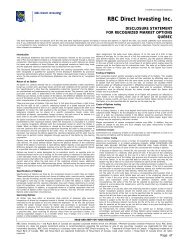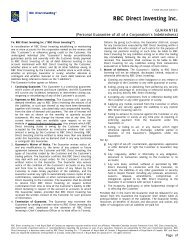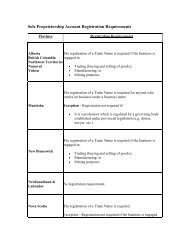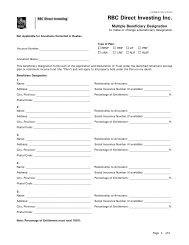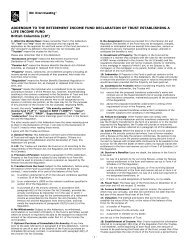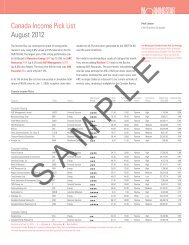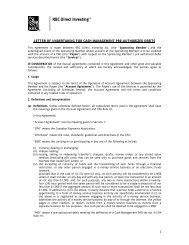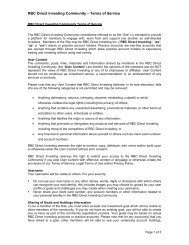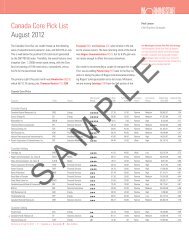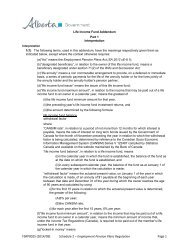View Sample PDF - RBC Direct Investing
View Sample PDF - RBC Direct Investing
View Sample PDF - RBC Direct Investing
You also want an ePaper? Increase the reach of your titles
YUMPU automatically turns print PDFs into web optimized ePapers that Google loves.
Global Investment Outlook • Eric Lascelles • Daniel E. Chornous, CFA • John Richards<br />
but more problematic, alternative is a<br />
much more extreme Greek government<br />
that will seek to pry loose major planks<br />
of the Greek bailout, and in so doing<br />
risk the viability of Greece within the<br />
Eurozone. In fairness, some form of<br />
renegotiation with Europe will be<br />
necessary regardless of the election’s<br />
victor: Greece still has too much debt,<br />
possibly insolvent banks and a freefalling<br />
economy. It is also missing<br />
austerity targets left and right.<br />
Meanwhile, in the lead-up to the<br />
election, Greece is effectively<br />
rudderless. A slow-motion run on<br />
its banks is occurring, and if this<br />
continues to accelerate, there are no<br />
leaders to arrest it. This is just one<br />
of several scenarios that could push<br />
Greece out of the Eurozone. A failed<br />
bluff or a simple policy misstep would<br />
also suffice.<br />
The most cogent argument in favour of<br />
continuing Greek membership is that<br />
an exit would set an awful precedent<br />
and quite possibly begin an irreversible<br />
unravelling of the Eurozone. No one<br />
wants this, and so quite a lot of<br />
firepower will be used to avoid this fate.<br />
Greece’s exit would certainly be<br />
economically devastating. Estimates<br />
vary widely, but the Greek economy<br />
would likely shrink by 15% or more,<br />
and it would suffer a massive run<br />
on its banks, widespread business<br />
bankruptcies, a bout of very high<br />
inflation, and an assortment of other<br />
ills. Meanwhile, the rest of Europe<br />
would be presented with a bill for<br />
about €300 billion in loans gone bad,<br />
and conceivably incur total costs in<br />
the range of €1 trillion. All told, the<br />
economic hit might be akin to the post-<br />
EXHIBIT 10.<br />
%<br />
EXHIBIT 11.<br />
%<br />
100<br />
80<br />
60<br />
40<br />
20<br />
90<br />
80<br />
70<br />
60<br />
50<br />
0<br />
Greece Wants Euro<br />
81%<br />
Greeks wish to<br />
remain in Euro<br />
Source: GPO SA, May 30, 2012<br />
Spanish Debt-to-GDP Ratio Not So Bad<br />
France<br />
Source: Haver Analytics, <strong>RBC</strong> GAM<br />
Lehman experience. Eurozone-wide<br />
GDP could easily shrink by 2% to 4%.<br />
It is difficult to say whether global<br />
financial markets would freeze with<br />
quite the ferocity of 2008 given the<br />
lessons learned since then, but they<br />
would certainly not function normally,<br />
and this would be the primary means<br />
by which a Greek exit could ricochet<br />
well beyond European shores.<br />
We reiterate that while this scenario<br />
is horrifying to contemplate, it also<br />
constitutes a central reason why a<br />
Germany<br />
2011<br />
52%<br />
Greeks wish to remain in Euro even if<br />
bailout not renegotiated<br />
Spain<br />
SAMPLE<br />
Greek exit remains unlikely: nobody<br />
wants the consequences.<br />
Spanish woes<br />
Spain remains a curious case. It has<br />
far less government debt than the<br />
European norm, and even than France<br />
or Germany (Exhibit 11). By this<br />
definition it is eminently solvent and in<br />
an enviable position.<br />
However, everything else about Spain<br />
is much more dour. It has a large<br />
fiscal deficit that is proving resistant<br />
The global investment outlook <strong>RBC</strong> INVESTMENT Strategy coMMITTEE Summer 2012 I 15



